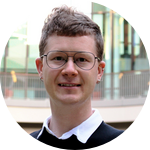About This Project
Using enzymes in environments other than water has enormous bioengineering potential, but a major roadblock is our lack of theory for protein folding outside of water. I am developing an integrated computational and high-throughput screening platform and will learn through the creation of proteins that natively fold and function in non-water environments and catalyze biofuel production. Future applications include plastics recycling, bioremediation, and industrial chemical synthesis.
Ask the Scientists
Join The DiscussionWhat is the context of this research?
Current feats of protein engineering (modifying existing protein sequences) and design (computing complete protein sequences) have barely scratched the surface of what is possible because of a critical gap: our understanding of proteins is generally limited to proteins that fold and function in water. 30 years of attempts to transfer industrial enzymes into organic solvents have resulted in generally poor stability, activity, and/or reusability. Fundamentally, no natural proteins are known to natively prefer bulk non-aqueous environments. Thus, determining biophysical principles for designing proteins that partition into, fold in, and function in non-aqueous environments –non-aqueous proteins – would reshape our understanding of protein folding, stability, and assembly.
What is the significance of this project?
Useful catalytic activities can be installed into non-aqueous proteins once the scaffolds are designed. As a proof of concept, I am focused on catalyzing transesterification with non-aqueous proteins for biofuel generation in pure lipid solutions (e.g. waste cooking oil – 3 billion gallons/year from restaurants, 2% of US annual gasoline consumption). Long-term applications include water-treatment proteins that partition into and degrade microplastics (e.g. hydrophobic PETase), catalytic proteins that release hydrogen gas from petroleum without releasing CO2 (e.g. petroleum dehydrogenase), catalytic proteins for remediation of petroleum spills (e.g. hydrophobic monooxygenase), and catalytic proteins that streamline fine chemical synthesis and reduce energy input (e.g. metalloenzymes).
What are the goals of the project?
Two key barriers block the potential in non-aqueous protein engineering: 1) we lack a general theory of protein folding in non-aqueous solvents – limiting design, and 2) we lack biochemical tools for proteins in non-aqueous solvents – limiting engineering.
1) Develop a proof-of-concept de novo transesterase for biofuel synthesis
I will design catalytic peptides for non-aqueous environments, assay transesterase activity, characterize reaction kinetics, and determine molecular structures.
2) Develop a screening platform for non-aqueous proteins
High-throughput screening has revolutionized protein biotechnology. I will develop the first generalizable platform for non-aqueous proteins to rapidly screen 10^3-10^6 protein sequences for expression, solvent partitioning, and catalytic activity.
Budget
N/A
 Project Timeline
Project Timeline
N/A
Dec 01, 2025
Proof of concept -- de novo transesterase
Dec 01, 2026
Platform -- microfluidics screening platform demonstration
Meet the Team
Affiliates
Team Bio
The project is led by Dr. Samuel Thompson under a joint postdoctoral appointment with Prof. Polly Fordyce, an innovator in developing microfluidic approaches to dissecting protein function, and Prof. David Baker (University of Washington) a founder of the field of protein design. We are uniquely positioned to integrate the recent developments in high-throughput DNA synthesis and sequencing and massive-throughput in vitro library screens to unlock the potential in non-aqueous proteins.
Samuel Thompson
I use the power of templated synthesis (e.g. ribosomal synthesis) to develop materials with world-changing potential by controlling angstrom scale structure and molecular function. As a postdoctoral scholar, my long-term goals are to pursue an independent academic research program centered on engineering functional proteins to address global needs for carbon neutral fuel sources, and environmentally sustainable industrial materials, diverse antibiotics that combat the rise of pathogenic resistance, and new therapeutic modalities that interface with lipid biology. Specifically, I aim to expand the usefulness of protein biotechnology by developing methods for using protein in chemical environments other than water.
My background is first rooted in materials science and functional polymer chemistry from my high school research in the lab of Prof. Zhibing Hu (University of North Texas). I then chose to focus on proteins as a programmable polymer material, and I pursued natural protein re-engineering with Prof. Alice Ting (MIT, Stanford University) followed by structural biology studies of large enzymatic complexes with Prof. Catherine Drennan (MIT) and Prof. Junichi Takagi (Osaka University). Observing the limitations of rational design and screening-based approaches for identifying protein catalysts for non-natural reactions and reaction conditions, I chose to center my graduate studies on computational protein design in the lab of Prof. Tanja Kortemme (UCSF). This project took on a large cell biology component when I traced the origins of unusual observations in a deep mutational scanning experiment and ultimately identified a quality control protease that modulates the mutational landscape for in vivo selection in E. coli. Thus, my experience has been both broad and exploratory while also tightly focused on my primary motivation: expanding the potential in protein engineering by quantifying sequence-structure-function-environment relationships.
Project Backers
- 0Backers
- 100%Funded
- $137,500Total Donations
- $0Average Donation
